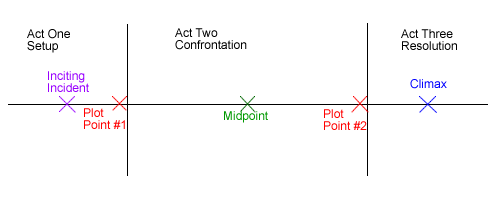
I’ll think twice about referring to Act II as “no man’s land” for fear of sounding like an insensitive A-lister comparing Hollywood to a tour of duty. Instead I’ll just call it what it is--a soul-sucking black hole of disparity that prematurely puts an end to well-intended screenplays.
Ask any aspiring writer, chances are they’ve got several specs hopelessly floating around page forty-five in a folder somewhere on their 2007 dual-core HP.
Why?
Wading through Act II is likened to reliving life as a ten-year-old counting down the days to Christmas -- in July. Bear with me. The sheen of Act I is wearing off, you’re questioning your entire concept, you’d rather run through the sprinklers with your friends, and that brilliant twist you can’t wait to pull off is still fifty-plus pages away. Like a kid waiting for Christmas, you're stuck window-shopping for what feels like an eternity...at home...in front of a computer. (A 2007 dual-core HP -- even that needs an upgrade.) Act II is a challenge. Here are some tips to help defend your work against the greatest screenwriting villain of all: giving up.
Don’t walk. Don’t run. SPRINT. Get the pages written--especially if you don’t work off an outline. Give yourself what every writer loves most in the world, something to criticize. If it’s on the page, it exists. It’s a structure, and it either works or it doesn’t. When it works--celebrate. When it doesn’t--celebrate. Either way, you’ve added to your page count. Think about the times in your life when you’re not writing--stuck in your car, at work, at a family function, etc. It’s a lot easier to mentally work through something that exists rather than try to come up with your next set of scenes. Screenwriting gurus suggest to stop writing for the day when you know exactly what the next scene will be. Let that apply, but don’t use it as an excuse to procrastinate.
Listen to your characters. Here’s your opportunity to apply your Whole Foods organic sensibilities to your screenplay. Chances are, your plot is set. Don’t use Act II to change directions. Instead, let your characters react to what you’ve placed in front of them, keeping in mind that a good plot has strong conflict. I’m not saying you can’t explore (skip down to the last point); I’m simply suggesting that if you’re stuck, you should determine the moral compass of your characters and follow their lead. You’ll most likely find that it’ll prevent you from getting the “I just don’t believe the character would do this,” note. (Unless you’re writing horror, then you can have them do whatever will get them killed in the most idiotic and creatively grotesque fashion possible).
Think of Act II like the Golden Gate Bridge. Yes, it serves to connect San Francisco with Marin County, but it’s also a national landmark in and of itself. Act II bridges Act I and Act III, but it should be just as masterful in its creation as any other piece of your story. Force the readers out of their cars to walk through and marvel the architecture of Act II. The better built, the less likely your readers will skim or move onto the next script. Pay off your players. I love supporting characters. I love when they are real people to behold with strong arcs of their own. When a supporting character is well-developed, they’re more prominent in the lives of our leads and in the minds of our audience. Act II is your chance to pay off their stories. Think about Bubba Blue and Lieutenant Dan in Forrest Gump: two wildly memorable supporting characters whose arcs were paid off in Act II.
Turn it up to 11. Take each scene and notch it up--and that doesn’t just apply to action flicks. Here’s a good time to remember you’re writing a movie. Chances are, you yearn to explore larger-than-life scenarios--escapism, perhaps the why in “why we write.” So have fun. Letting loose allows your creative tendencies to freely flow and can burst the bubble that’s keeping your story bogged down in doubt. Remember, this is your first draft and you’re going to rewrite the hell out of these pages. Go ahead and blow up half a continent or have your lead join the circus (provided it fits within his/her moral compass). If you go too far, you can and will scale it back.
Moral of the story: get it done.
Get Our Screenwriting Newsletter!
Get weekly writing inspiration delivered to your inbox - including industry news, popular articles, and more!





















